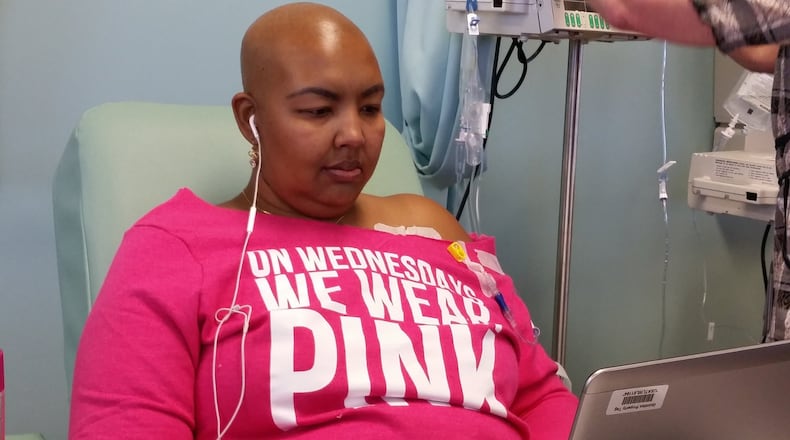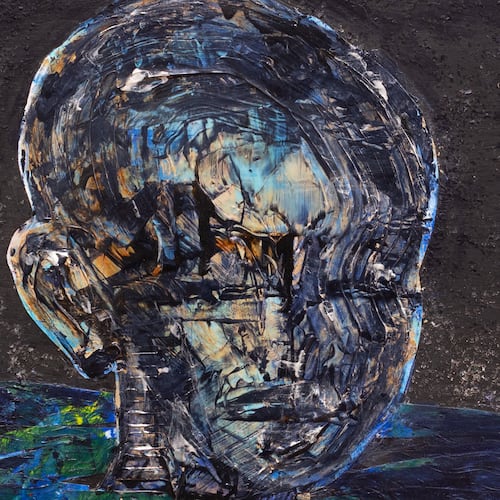Listening to Tiah Tomlin recall her journey from cancer to remission, I was reminded of something I’ve always known: “hope maketh not ashamed.”
That doesn’t come from reading Scripture. It comes from experience, and when I met her recently, it was clear to me that that she had seen some things.
Days after burying her grandfather in 2011, Tomlin’s father suffered a major stroke. While her sister-in-law was recovering from surgery, her brother was diagnosed with cancer. A week after her nephew was diagnosed with scoliosis, Tomlin’s mother suffered a heart attack.
2012 pretty much began and ended the same way.
Now, at just 38, nearly 10 years under the recommended age for a mammogram, it was her turn.
After years of checking, Tomlin noticed something different one morning about her right breast.
“I had an inverted nipple,” she said. “That put fear in me.”
A mammogram revealed nothing, but four years later during another self-exam, she felt a lump as hard as a rock.
“I knew it was cancer,” she said.
Tomlin was determined to remain positive. She followed up with her doctor and the next day went in for a mammogram. After hours of Tomlin watching women come and go, doctors suggested an ultrasound and then finally a biopsy.
Around 4 p.m. June 17, 2015, her suspicion was confirmed. She had infiltrating ductal carcinoma, the most common form of breast cancer, representing 80 percent of all breast cancer diagnoses.
Tomlin wept.
RELATED | Ladies, this is serious. Are you dense?
Days later, she flew home to Richmond, Virginia, to break the news and rally the troops.
They were seated around the family room when Tomlin finally opened up. They prayed, talked about the next steps, and days later, Tomlin and her mother flew back to Atlanta.
After meeting her oncologist at the Northside Hospital Cancer Institute to map out a treatment plan, the packing of any toxic personal care and household items began.
Tomlin and her mom would replace those items with more healthful options.
On June 26, there was more bad news. The cancer was triple negative stage 2A, a rare type of breast cancer that disproportionately affects African Americans like her and other minorities.
According to Emily Beard, a registered nurse and coordinator of the institute’s Women’s Oncology Program, this type of cancer is particularly aggressive and difficult to treat. It is also more likely to spread and recur than other types of the disease.
Tomlin would have to undergo eight rounds of chemotherapy, a lumpectomy and 33 rounds of radiation.
“I pulled together a prayer team,” she said. “My dad sent Scripture and other encouraging words. Every Wednesday, we fasted.”
Tomlin knew from experience that prayer works; that as it’s written in Romans that by faith in God’s grace “we stand, and rejoice in hope of his glory.”
“And not only so, but we glory in tribulations also: knowing that tribulation worketh patience; And patience, experience; and experience, hope: And hope maketh not ashamed.”
She knew because she had lived it.
RELATED | A mother and her daughters bare all to help prevent breast cancer
Being human, she worried too. How would she be able to follow through with a 5K Suit Run she was planning with the American Cancer Society to raise awareness about prostate cancer? Was it still feasible to offer a coach to a friend who needed her when chemo promised to wipe her out? Would anyone ever want her without breasts?
As she considered the fact that she might die, Tomlin said God spoke.
“Take up your bed,” she said he told her. “You saw what I did for your dad,” she remembered God saying. “Take up your bed and fight.”
Tomlin got up, walked to edge of her bed and wrote on the mirror: “My faith is my healing power. God let your will be done.”
In that moment, she said she knew her diagnosis was about far more than herself. It was about helping others go through their storms.
The next couple of months were terrible and terrifying. Tomlin could barely swallow. Her nails turned black and fell off. She couldn’t walk.
On Oct. 14, 2015, two days after her 39th birthday, Tiah Tomlin was cancer-free. In November, instead of Tomlin undergoing a double mastectomy, doctors performed a lumpectomy that included reconstruction of her nipple and a reduction. She completed radiation on March 10, 2016, but returns every three months to see her oncologist and every six months to check in with her surgeon to make sure there are no new tumors.
RELATED | Help you need after a breast cancer diagnosis
Nearly four years have passed since Tomlin’s diagnosis, but she is still telling people what God is doing in her life, hoping it will help others who are experiencing illness and the loneliness that can often bring.
Credit: The Atlanta Journal-Constitution
Credit: The Atlanta Journal-Constitution
“I was fighting for my life. I wanted to hear things that were uplifting,” she said. “I wanted a personal connection with someone who was going through what I was going through.”
Tomlin started a Facebook support group she called “My Breast Years Ahead,” for women, mostly minorities. facing cancer.
It started slow with her writing the majority of posts, but after a few months, it took off.
RELATED | What is DCIS and is this type of breast cancer overtreated?
Today, the group consists of nearly 370 women, mostly African Americans ages 22-65, in the Atlanta area who share advice, refer doctors and offer support to one another.
“We just love up on one another,” she said.
What began as a support group, however, soon morphed into a nonprofit called My Style Matters, providing educational and other support.
“We hold hands,” Tomlin said. “No survivor walks the journey alone. I call them. I provide transportation to chemotherapy if needed. I advocate. I’ve even made sure a student went to her prom.”
Why?
“I knew this journey wasn’t just about me,” she said.
Find Gracie on Facebook (www.facebook.com/graciestaplesajc/) and Twitter (@GStaples_AJC) or email her at gstaples@ajc.com.
About the Author
Keep Reading
The Latest
Featured







